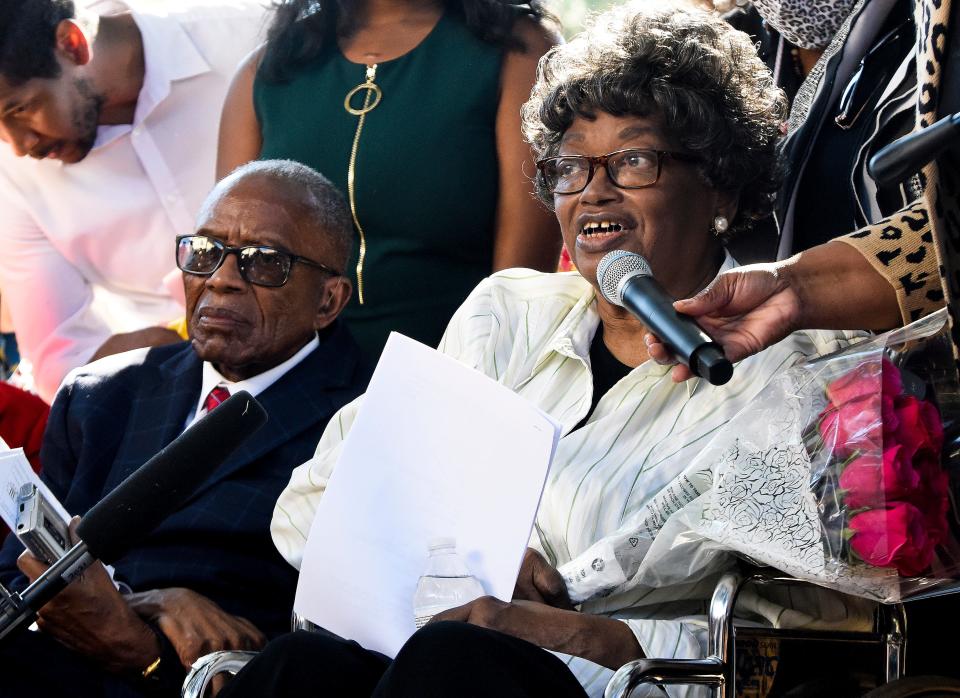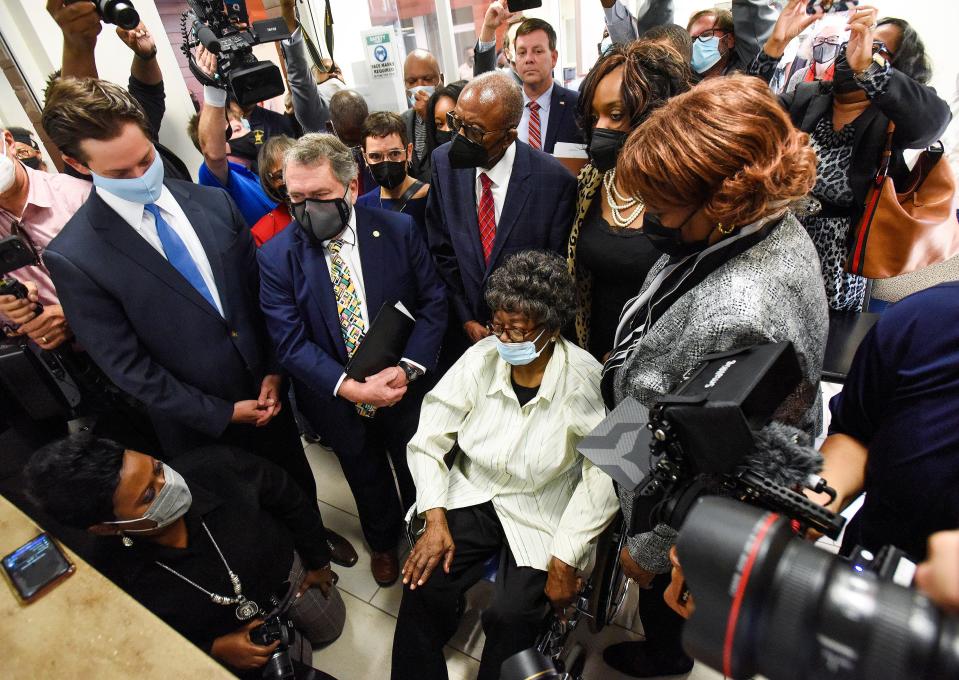Claudette Colvin's 1955 arrest record for refusing to give up bus seat to white person expunged
- Oops!Something went wrong.Please try again later.
- Oops!Something went wrong.Please try again later.
A Montgomery Juvenile Court judge has expunged Claudette Colvin's 1955 arrest for challenging segregation on the city's bus lines, an act that preceded Rosa Parks' similar challenge by nine months.
Calvin Williams, a juvenile judge, wrote in a Nov. 24 order granting the expungement that the decision represented "a measure of statutory right and fairness to the said Claudette Colvin for what has since been recognized as a courageous act on her behalf and on behalf of a community of affected people."
Colvin, who was 15 years old when she was arrested, said during a press conference on Tuesday she was "not really celebrating" because of the 66 years it took to get the expungement, but she joked that "that really means that I'm no longer, at 82, a juvenile delinquent."
Montgomery: Who was Claudette Colvin? Honoring the Montgomery woman arrested for refusing to give up bus seat

"My reason for doing it is I get a chance to tell my grandchildren, my great-grandchildren, what life was like living in segregated America, in segregated Montgomery," she said. "The laws, the hardship, the intimidation that took place during those years and the reason why that day I took a stand and defied the segregated law."
Colvin would serve as plaintiff in Browder v. Gayle, which ended segregation on Montgomery city buses after the Montgomery Bus Boycott.

On March 2, 1955, Colvin, then a 15-year-old student at Booker T. Washington High School, was riding a bus on Dexter Avenue, headed toward Court Street, when a group of white passengers boarded. Under the segregation laws of the time, whites sat in the front; Blacks sat in the back, and a "no man's land" of seats separated the two.
Colvin and three other Black women sat in the "no man's land" when the white driver ordered them to vacate their seats for the white people who had boarded. As historian Taylor Branch wrote, two of the women complied, but Colvin and another woman pretended not to hear.
The bus driver eventually called three police officers on the bus, who asked the Black men in the back to surrender their seats to the women. One did so, but Colvin refused to move, defending her right to remain on the bus.
Colvin said Tuesday she had been outraged by the case of Jeremiah Reeves, a 16-year-old convicted in 1952 of raping a white woman after a coerced confession; Reeves was executed in 1958 despite major protests over the case.
"I felt as though Harriet Tubman was pushing me down on one shoulder and Sojourner Truth was pushing me down on the other," she said. "So therefore, history had me glued to the seat. That was the reason I could not move."
The police dragged Colvin off the bus, then slapped handcuffs on her and drove her to the local jail at city hall. Colvin told the Advertiser in 2019 that she heard sexually suggestive remarks as she was taken to her cell.
"As a teenager, that’s when I became really scared," Colvin said. "In an old Western, when the bandits are put in the jail, you can hear the sound of the key go 'click.' I could hear the sound when the jailer locked it. I knew I was locked in, and I couldn’t get out. I started crying. I started reciting the 23rd Psalm."
Washington: DOJ closes Emmett Till investigation after reopening 1955 murder case for new evidence
Colvin's mother and pastor came a few hours later to bail her out. Prosecutors charged Colvin with disorderly conduct, assault and violating segregation laws. The arrest, particularly the use of handcuffs on the young teenager, angered many in Montgomery's Black community. Local activists, including former NAACP President E.D. Nixon and 24-year-old attorney Fred Gray saw her case as a potential challenge to the segregation laws.

Colvin was found guilty at a first trial. But on appeal, a judge dismissed the segregation charge and the disorderly conduct charge, leaving only the assault charge. She was sentenced to indefinite probation.
Gray wanted to push the case further, but Branch wrote that the dismissal of the segregation charge made it more difficult to raise a constitutional challenge in federal court. Witnesses feared testifying, and while Colvin wanted to go to court, some Black leaders thought Colvin was immature and would be "an extremely vulnerable standard bearer," Branch wrote. Colvin was also pregnant, which further dampened enthusiasm.
Nine months after Colvin's arrest, Rosa Parks was arrested on a Montgomery city bus. Like Colvin, she had been sitting in the "no man's land" of the bus. Unlike Colvin, Parks had more than 15 years of experience as an activist and only faced a charge of violating city segregation laws, which opened a door to a federal challenge. Colvin, who knew Parks through the NAACP youth group, said the two of them had "a good relationship."
"E.D. Nixon said that they wanted Mrs. Parks to be the face of the Montgomery Bus Boycott because she would draw out more Black adult participants," Colvin said Tuesday. "But the movement was there. The young people was ready to protest."
The months after the arrest were lonely, Colvin said in 2019.
"It was difficult because people looked at me differently," she said. "The people who didn’t know me said that I was crazy. That I was causing trouble. Some of the parents didn’t want their children to be associated with me."
Gray, who also represented Parks, included Colvin as a plaintiff in Browder v. Gayle, which ended segregation on Montgomery city buses. In his autobiography, Bus Ride to Justice, Gray wrote that he was "disappointed" in the result of the Colvin case but said that it gave him "courage and a faith that there would be another opportunity to challenge Alabama's segregation laws."
"We knew there would be another opportunity and we would be ready," he wrote. "There were at least four persons who were ready then — Claudette Colvin, Jo Ann Robinson, E.D. Nixon and Fred Gray. We waited."
Colvin later moved to New York and worked for decades as a nursing aide. But her sentence to "indefinite probation" remained on the books. The juvenile court no longer had authority over Colvin, but Colvin's attorney Phillip Ensler told the Advertiser in October that the charge made her family fearful when she came to visit.

The petition had the support of Montgomery Mayor Steven Reed and Montgomery District Attorney Daryl Bailey. The Alabama Legislature in November passed separate House and Senate resolutions, sponsored by Rep. Merika Coleman, D-Pleasant Grove, and Sen. Kirk Hatcher, D-Montgomery, urging the expungement of her record.
Colvin said Tuesday she had seen some progress in the nation, saying Black Americans were more willing to protest injustice, through organizations such as Black Lives Matter. But, she said, "Double standards still exist in the judicial system," saying there was "one set of rules for African Americans, and another set of rules for Caucasians."
"I thank God that we have made a lot of progress, but we still have a long way to go," she said. "One thing I hope will not happen is that we regress instead of progress, and continue from the grounds of the progress that we have made."
Contact Montgomery Advertiser reporter Brian Lyman at 334-240-0185 or blyman@gannett.com.
This article originally appeared on Montgomery Advertiser: Alabama: Claudette Colvin's arrest over segregation challenge expunged

